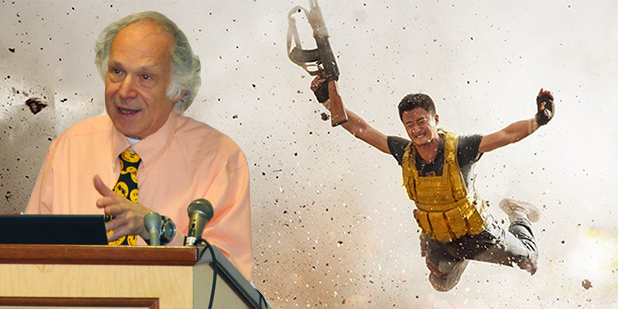Join us for a free one-day workshop for educators at the Japanese American National Museum, hosted by the USC U.S.-China Institute and the National Consortium for Teaching about Asia. This workshop will include a guided tour of the beloved exhibition Common Ground: The Heart of Community, slated to close permanently in January 2025. Following the tour, learn strategies for engaging students in the primary source artifacts, images, and documents found in JANM’s vast collection and discover classroom-ready resources to support teaching and learning about the Japanese American experience.
Video: China’s Efforts To Build Its Soft Power
Political scientist Stan Rosen evaluates whether or not China’s soft power has grown in recent years.

China has invested heavily in strengthening its cultural industries, its media industries, and in promoting study of the Chinese language and Chinese culture. Political scientist Stan Rosen has long studied China’s efforts, particularly in film. In this talk he’ll examine what soft power is and how it works and discuss Chinese efforts to acquire more of it. Rosen will conclude with an evaluation of whether or not China’s soft power has grown in recent years.
This video is also available on the USCI YouTube Channel.
About the Speaker
Stanley Rosen, a member of the USC U.S.-China Institute’s executive committee, is a professor of political science. He is editor, along with Kingsley Edney and Ying Zhu of the forthcoming book Soft Power with Chinese Characteristics: China’s Campaign for Hearts and Minds (Routledge, 2019). Among his earlier edited books are Chinese Politics: State, Society and Market (with Peter Gries), Art, Politics and Commerce in Chinese Cinema (with Ying Zhu), and On Socialist Democracy and the Chinese Legal System (with Jonathan Unger and Anita Chan). He’s the author of Red Guard Factionalism and the Cultural Revolution in Guangzhou and many articles and book chapters. He is the co-editor of the journal Chinese Education and Society.
Featured Articles
Please join us for the Grad Mixer! Hosted by USC Annenberg Office of International Affairs, Enjoy food, drink and conversation with fellow students across USC Annenberg. Graduate students from any field are welcome to join, so it is a great opportunity to meet fellow students with IR/foreign policy-related research topics and interests.
RSVP link: https://forms.gle/1zer188RE9dCS6Ho6
Events
Hosted by USC Annenberg Office of International Affairs, enjoy food, drink and conversation with fellow international students.
Join us for an in-person conversation on Thursday, November 7th at 4pm with author David M. Lampton as he discusses his new book, Living U.S.-China Relations: From Cold War to Cold War. The book examines the history of U.S.-China relations across eight U.S. presidential administrations.




